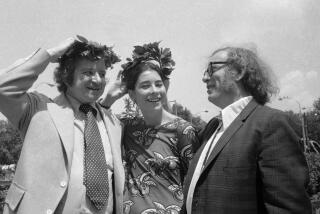Allan Bloom; Critic of U.S. Colleges
- Share via
CHICAGO — Allan Bloom, author of the 1987 bestseller “The Closing of the American Mind,” a scathing critique of America’s colleges and universities, died Wednesday at the age of 62.
Bloom, a University of Chicago professor, died of peptic-ulcer bleeding complicated by liver failure.
His book, subtitled “How Higher Education Has Failed Democracy and Impoverished the Souls of Today’s Students,” challenged universities to return to a more traditional curricula.
His close friend and colleague, Saul Bellow, praised Bloom for his teaching expertise and his ability to relate to his students.
“Allan Bloom was a true teacher, by which I mean he believed it to be monstrous that any of us should lose our souls through ignorance,” said Bellow, also a University of Chicago professor and a Nobel Prize-winning author.
Bloom served as the John U. Nef Distinguished Service Professor on the university’s Committee on Social Thought. His critical translation of Plato’s “Republic,” published in 1968, has become a widely used work in college courses.
The National Endowment for the Humanities awarded Bloom the Charles Frankel Prize this year in recognition of his work, noting that his bestseller “continues to shape public and academic discussion.” The book has sold more than 1 million copies.
Bloom’s book said all was well on U.S. campuses until the 1960s, when students began asking rude questions, called ancient verities mere opinions and placed Mick Jagger and his ilk above Bloom’s beloved Plato and Aristotle as popular icons.
Columnist George Will said Bloom was a modern-day prophet.
“He not only ignited the intellectual lives of his students . . . he quickened the pace of national reflection about the most important things,” Will said.
Bloom is survived by his mother, Malvina Bloom Wessel, and stepfather, Herman Wessel, both of Philadelphia, and a sister, Lucille Wallace, of Winnetka, Ill.
More to Read
Sign up for our Book Club newsletter
Get the latest news, events and more from the Los Angeles Times Book Club, and help us get L.A. reading and talking.
You may occasionally receive promotional content from the Los Angeles Times.







